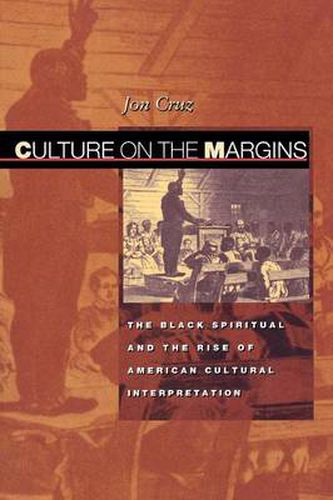Readings Newsletter
Become a Readings Member to make your shopping experience even easier.
Sign in or sign up for free!
You’re not far away from qualifying for FREE standard shipping within Australia
You’ve qualified for FREE standard shipping within Australia
The cart is loading…






In Culture on the Margins , Jon Cruz recounts the ‘discovery’ of black music by white elites in the nineteenth century, boldly revealing how the episode shaped modern approaches to studying racial and ethnic cultures. Slave owners had long heard black song making as meaningless ‘noise’. Abolitionists began to attribute social and political meaning to the music, inspired, as many were, by Frederick Douglass’s invitation to hear slaves’ songs as testimonies to their inner, subjective worlds. This interpretive shift - which Cruz calls ‘ethnosympathy’ - marks the beginning of a mainstream American interest in the country’s cultural margins.In tracing the emergence of a new interpretive framework for black music, Cruz shows how the concept of ‘cultural authenticity’ is constantly redefined by critics for a variety of purposes - from easing anxieties arising from contested social relations to furthering debates about modern ethics and egalitarianism. In focusing on the spiritual aspect of black music, abolitionists, for example, pivoted toward an idealized religious singing subject at the expense of absorbing the more socially and politically elaborate issues presented in the slave narratives and other black writings. By the end of the century, Cruz maintains, modern social science also annexed much of this cultural turn. The result was a fully modern tension-ridden interest in culture on the racial margins of American society that has long had the effect of divorcing black culture from politics.
$9.00 standard shipping within Australia
FREE standard shipping within Australia for orders over $100.00
Express & International shipping calculated at checkout
In Culture on the Margins , Jon Cruz recounts the ‘discovery’ of black music by white elites in the nineteenth century, boldly revealing how the episode shaped modern approaches to studying racial and ethnic cultures. Slave owners had long heard black song making as meaningless ‘noise’. Abolitionists began to attribute social and political meaning to the music, inspired, as many were, by Frederick Douglass’s invitation to hear slaves’ songs as testimonies to their inner, subjective worlds. This interpretive shift - which Cruz calls ‘ethnosympathy’ - marks the beginning of a mainstream American interest in the country’s cultural margins.In tracing the emergence of a new interpretive framework for black music, Cruz shows how the concept of ‘cultural authenticity’ is constantly redefined by critics for a variety of purposes - from easing anxieties arising from contested social relations to furthering debates about modern ethics and egalitarianism. In focusing on the spiritual aspect of black music, abolitionists, for example, pivoted toward an idealized religious singing subject at the expense of absorbing the more socially and politically elaborate issues presented in the slave narratives and other black writings. By the end of the century, Cruz maintains, modern social science also annexed much of this cultural turn. The result was a fully modern tension-ridden interest in culture on the racial margins of American society that has long had the effect of divorcing black culture from politics.